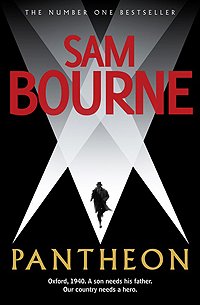
Our protagonist is James Zennor, a complex man. He’s an Oxford psychology don, but this is 1940 – a long time before the subject became fashionable in the 60s. His beautiful wife Florence used to be an olympic swimmer, and they have a toddler called Harry. But James is a broken man. He’s not fighting in France because his shoulder was badly wounded when he fought for the socialists in the Spanish Civil War. We see such gruesome experiences in flashbacks.
The story opens with James returning from his morning rowing practice to find Florence has taken Harry and left him. And as he trashes his college cottage you soon realise why – his awful temper borders on insanity. You begin to realise he’s suffering from post traumatic stress disorder, a condition that wasn’t really understood in 1940. Speaking to friends and neighbours he works out that Florence left for Liverpool, ultimately heading to Yale in a group of 25 Oxford mothers with 125 children. She’s escaping invasion-threatened Britain, and James’s unbearable anger.
What he lacks in self-control, he makes up for in willpower and soon James is on a convoy vessel leaving Liverpool. Arriving in Canada he makes his way down to Yale having bullied his superior at Oxford into finding him a post there. Very soon he’s blustering around demanding to see Florence and Harry. Trouble is, a conspiracy is working against him and no sooner does he find someone who can give him some information than the man is found hanged. Initially James is suspected, but the barman where he was drinking at the time of the death gives him an alibi. It’s clear Yale’s dean has something to hide, but James meets a young woman writing for the college paper who offers to help.
Meanwhile, in a sub-plot back home, a young American working at their embassy in London is drawn into a clique of right wing aristocrats who hate Jews, doubt Churchill, and think a truce with Hitler would be a good idea. How will this interweave with James’ dilemmas?
Though intelligent and impassioned, James isn’t all that likeable. He often loses his temper at just the moment he could make a breakthrough – one step forwards, two steps back. He seems to run everywhere, which becomes almost comical at times. Yet you pull for him as he appears to be on the side of right. America’s a different world to him, no rationing, and little interest in standing up to Hitler. He discovers that the evacuation of the 125 children from Oxford to Yale might have a sinister root. Key players behind it believe in eugenics, the idea – embraced by the Nazis – that you can breed superior people.
There were a few sections towards the end where I found it a little implausible that copies of important documents weren’t kept, and James is a little too frustrating at times. However he gradually brings his rational side to bear against his guilt and anger. He must fight for his country, fight for his wife, and fight for his life. As such, Pantheon is a page-turning thriller that ploughs forward and then powerfully twists and thrashes like a constrictor as one man’s story meets the force of history. When you read the author’s notes at the end, you’ll discover just how much of it is true to life. It’s a reassessment of WWII that really makes you think, and a very good read.
HarperCollins
Print/Kindle/iBook
£6.99
CFL Rating: 4 Stars